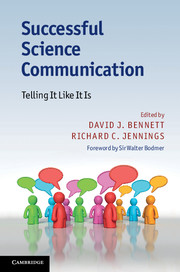Book contents
- Frontmatter
- Contents
- Foreword
- Authors' biographies
- Introduction Public engagement in an evolving science policy landscape
- Part I What it helps to know beforehand
- Part II Policy-makers, the media and public interest organisations
- 8 Research and public communication in EU policy and practice
- 9 Tackling the climate communication challenge
- 10 Dealings with the media
- 11 Dealings with the U.S. media
- 12 Relations with public interest organisations: consumers
- 13 Relations with public interest organisations: patients and families
- 14 Relations with environmental organisations: a very personal story
- Part III What you can do and how to do it
- Part IV And finally, evaluating and embedding science communication
- Index
- Plate section
- References
8 - Research and public communication in EU policy and practice
Published online by Cambridge University Press: 05 May 2013
- Frontmatter
- Contents
- Foreword
- Authors' biographies
- Introduction Public engagement in an evolving science policy landscape
- Part I What it helps to know beforehand
- Part II Policy-makers, the media and public interest organisations
- 8 Research and public communication in EU policy and practice
- 9 Tackling the climate communication challenge
- 10 Dealings with the media
- 11 Dealings with the U.S. media
- 12 Relations with public interest organisations: consumers
- 13 Relations with public interest organisations: patients and families
- 14 Relations with environmental organisations: a very personal story
- Part III What you can do and how to do it
- Part IV And finally, evaluating and embedding science communication
- Index
- Plate section
- References
Summary
Introduction
Along with the United States, Japan and China, Europe is today one of the major international players in science. Since 1984, the European Union (EU) has been implementing research policy through successive so-called Framework Programmes (FPs). The Seventh Framework Programme (FP7) covers the period from 2007 to 2013 and has a budget of €53 billion, representing a 63% increase compared to the Sixth Framework Programme (FP6, 2002–2006). Still, EU R&D expenditures remain, in relative terms, quite low. The latest available data (Eurostat 2008) shows that the EU's 27 Member States, even though together the world's largest economy, devote only an average 1.90% of their gross domestic product (GDP) to R&D compared to 2.76% and 3.44% for the USA and Japan, respectively.
Publicly funded support for research in Europe increasingly encourages and even requires the beneficiaries to engage with the public and the media. For example, most of the UK Research Councils promote scientific outreach activities and provide the training needed by scientists to allow them to carry out those activities effectively. In particular, grant-holders have to develop a public communication strategy and in doing so they can get help from Research Council information and press staff.
- Type
- Chapter
- Information
- Successful Science CommunicationTelling It Like It Is, pp. 121 - 136Publisher: Cambridge University PressPrint publication year: 2011



